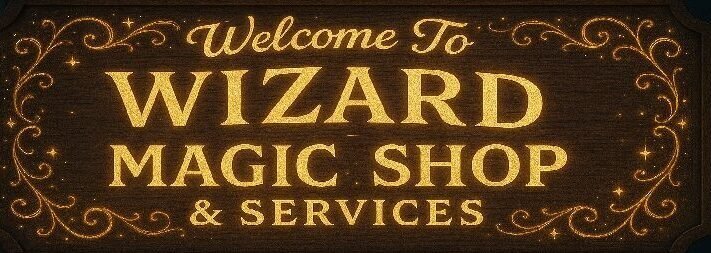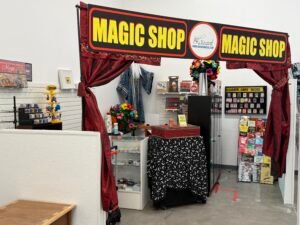The Disappearing Act: How to Save Traditional Magic Shops from Vanishing

Photo by <a href="https://unsplash.com/@louishansel" rel="nofollow">Louis Hansel</a> on <a href="https://unsplash.com/?utm_source=hostinger&utm_medium=referral" rel="nofollow">Unsplash</a>
Introduction: The Enchantment of Traditional Magic Shops
Traditional magic shops have been an integral part of the cultural tapestry, serving as sanctuaries of wonder and intrigue for generations. These establishments, often nestled in quaint corners of bustling cities or small towns, have historically provided an unparalleled sense of mystery and enchantment. For budding magicians and seasoned enthusiasts alike, visiting a magic shop is akin to stepping into a realm where the impossible becomes possible.
Unlike the sterile, impersonal experience of online shopping, traditional magic shops offer a rich, immersive atmosphere. The dim lighting, shelves lined with spellbinding artifacts, and the scent of old books and wooden cabinets evoke a sense of nostalgia and excitement. These shops are not merely retail spaces but are treasure troves of knowledge and history, where every item has a story and every visit, a personal touch.
Moreover, the interaction with knowledgeable shopkeepers, often magicians themselves, provides a unique and invaluable experience. These guardians of arcane wisdom offer demonstrations, personalized advice, and insider tips that cannot be replicated through a screen. Their passion and expertise create a community of like-minded individuals, fostering connections that extend beyond mere transactions.
The cultural significance of these shops cannot be overstated. They are custodians of a heritage that dates back centuries, preserving the art of illusion and sleight of hand. Each magic shop is a portal to the past, linking modern-day practitioners with the legends of yesteryears. As the digital age advances, the risk of these enchanting establishments fading into obscurity becomes ever more pressing.
Understanding the unique allure and irreplaceable value of traditional magic shops is the first step in ensuring their survival. By recognizing what makes these spaces special, we can better appreciate the need to protect and preserve them for future generations of magicians and dreamers.
Current Challenges: Why Are Magic Shops Disappearing?
The decline of traditional magic shops can be attributed to several converging factors that collectively threaten their existence. One of the most significant challenges is the rise of e-commerce. Online platforms offer a vast array of magic supplies and instructional materials, often at lower prices than brick-and-mortar stores. This convenience is appealing to consumers who can browse, compare, and purchase products from the comfort of their homes. According to a recent study, online sales of magic-related items have seen a growth rate of over 20% annually, putting considerable pressure on physical stores.
Changing consumer behaviors also play a crucial role. Today’s consumers, particularly younger generations, are more inclined towards digital forms of entertainment. The allure of traditional magic is being overshadowed by the instant gratification offered by video games, social media, and streaming services. This shift in interest reduces foot traffic to magic shops, which rely heavily on in-person demonstrations and personal interactions with customers.
Another critical factor is the rising cost of urban real estate. Magic shops, often located in vibrant urban centers to attract a diverse customer base, are struggling with escalating rents. A survey conducted in 2021 revealed that retail rents in major cities have increased by an average of 15% over the past five years. For many small business owners, these costs are unsustainable, leading to closures and relocations to less favorable locations.
The shift towards digital forms of entertainment has also impacted traditional magic shops. With the proliferation of online tutorials, virtual magic shows, and digital magic kits, consumers are less dependent on physical stores for learning and performing magic. A report by the Entertainment Software Association indicated that 67% of households play video games, a competing form of entertainment that draws attention away from traditional hobbies like magic.
These challenges, compounded by a global pandemic that has further accelerated online shopping and digital entertainment consumption, paint a concerning picture for the future of traditional magic shops. The need to adapt to these evolving market dynamics is more urgent than ever to ensure their survival.
The Importance of Preserving Magic Shops
Traditional magic shops hold a unique and irreplaceable place in both cultural and educational spheres. These establishments serve as vital hubs of community engagement, fostering a sense of belonging and shared interest among both seasoned magicians and enthusiastic newcomers. Within the walls of these shops, generations of knowledge are exchanged, and the magic community finds a tangible home.
One of the most significant contributions of magic shops is their role as learning centers for aspiring magicians. Unlike online resources, these stores offer the invaluable opportunity for hands-on experience and in-person mentorship. The tactile nature of magic – from handling props to perfecting sleight-of-hand techniques – cannot be fully replicated through digital means. Aspiring magicians benefit immensely from the guidance of experienced practitioners, who can provide personalized instruction and immediate feedback.
Moreover, magic shops are repositories of magical history, preserving a wide array of artifacts, literature, and paraphernalia that chronicle the evolution of the craft. These collections offer a tangible connection to the past, allowing enthusiasts to explore the rich heritage of magic. By maintaining these stores, we ensure that the historical context of magic is not lost to future generations.
The community aspect of magic shops cannot be understated. These venues often host events, workshops, and gatherings that bring people together, fostering a collaborative environment where ideas and techniques are shared. This sense of community is crucial for the development and sustenance of the art form, as it promotes a culture of continuous learning and mutual support.
In preserving traditional magic shops, we safeguard a cultural treasure trove and maintain a vital educational resource. The irreplaceable value of in-person mentorship and hands-on experience provided by these shops is essential for the continued growth and preservation of the magical arts.
Adapting to the Digital Age: Blending Tradition with Technology
In an era where digital innovation continually reshapes business landscapes, traditional magic shops face the pressing challenge of remaining relevant. Integrating technology into these storied establishments is not just a strategy for survival but an opportunity to thrive. A robust online presence is paramount. Establishing an e-commerce platform allows magic shops to reach a broader audience, offering a digital storefront that complements the physical shop. This can include detailed product descriptions, tutorial videos, and customer reviews to engage and inform potential buyers.
Virtual workshops and performances present another avenue for blending tradition with technology. Hosting live-streamed events or pre-recorded tutorials can attract enthusiasts from around the globe, providing them with in-depth learning experiences from the comfort of their homes. These sessions can replicate the intimate, personalized feel of in-store demonstrations, ensuring that the unique character of the magic shop is preserved. Additionally, interactive virtual performances can captivate audiences, showcasing the magical arts in a modern format.
Social media is a powerful tool for marketing and community building. Platforms such as Instagram, Facebook, and YouTube can be employed to share behind-the-scenes content, magical tips, and tricks, as well as customer testimonials. Engaging with followers through regular posts and live Q&A sessions fosters a sense of community and keeps the magic shop top-of-mind among enthusiasts. This digital engagement should reflect the shop’s unique character, blending nostalgia with contemporary flair to attract both seasoned magicians and newcomers.
Ultimately, the fusion of tradition and technology is essential for the survival of magic shops in the digital age. By creating an engaging online presence, offering virtual workshops and performances, and leveraging social media for marketing, these shops can maintain their unique charm while embracing modern tools. This balanced approach ensures that the magic continues to enchant audiences both old and new, preserving the rich heritage of magical arts for future generations.
Community Engagement: Building a Loyal Customer Base
One of the most effective strategies for ensuring the survival of traditional magic shops is fostering a vibrant and engaged community. By creating an environment where both seasoned magicians and curious novices feel welcomed, magic shops can cultivate a loyal customer base that extends beyond mere transactions. Hosting events such as magic shows, workshops, and meet-and-greet sessions with renowned magicians can significantly draw in crowds, providing immersive experiences that online stores simply cannot replicate. These events not only showcase the shop’s offerings but also create a sense of belonging and excitement among attendees.
Moreover, forming partnerships with local schools, community centers, and other businesses can amplify a magic shop’s visibility and engagement. Schools, for instance, can benefit from magic workshops as part of their extracurricular activities, sparking students’ interest in the art of magic. Community centers can host family-friendly magic shows which bring together diverse groups of people, fostering a sense of community spirit. Collaborative events with other local businesses, such as bookstores or cafes, can also attract a broader audience who might not have initially considered visiting a magic shop.
Utilizing social media platforms to promote these events and partnerships is crucial. Regularly updating followers on upcoming shows, workshops, and community activities can generate buzz and anticipation. Engaging with the community online through magic trick tutorials, behind-the-scenes content, and customer spotlights can further deepen connections and keep the magic alive beyond the shop’s physical space.
Additionally, loyalty programs and membership clubs can be instrumental in retaining customers. Offering exclusive benefits such as discounts, early access to events, and members-only magic sessions can make customers feel valued and more inclined to return. By intertwining these strategies, traditional magic shops can build a resilient and enthusiastic community foundation, ensuring their continued relevance and vibrancy in an evolving market.
Financial Strategies: Sustainable Business Models
In an era where traditional businesses face increasing challenges, magic shops must adopt sustainable business models to remain profitable. One effective strategy is diversifying product offerings. By expanding their inventory to include not only traditional magic supplies but also modern merchandise such as themed apparel, novelty items, and even digital magic tutorials, these shops can attract a broader customer base. Additionally, offering an online store can significantly increase reach and sales.
Creating membership programs presents another viable financial strategy. Memberships can offer exclusive benefits such as discounts, early access to new products, and members-only events. This not only generates a steady revenue stream but also fosters a loyal community of patrons. For instance, a monthly subscription box featuring curated magic tricks and accessories could keep customers engaged and regularly purchasing.
Securing grants or sponsorships from organizations that support cultural heritage can provide essential financial backing. Many foundations and cultural institutions are dedicated to preserving traditional arts and crafts, including magic. By aligning with these organizations, magic shops can obtain funding for various initiatives such as educational workshops, community events, or even preservation projects. This not only brings in financial resources but also enhances the shop’s reputation as a cultural custodian.
Looking at successful business models in other niche markets can offer valuable insights. For example, specialty bookstores have thrived by hosting author readings, book clubs, and literary events, creating a sense of community and an engaging customer experience. Similarly, magic shops can organize live performances, magic classes, and themed events to attract and retain customers.
By integrating these financial strategies, traditional magic shops can develop a sustainable business model that ensures their longevity. Diversifying products, implementing membership programs, and seeking external support are critical steps in making magic shops profitable while preserving their unique cultural heritage.
The Role of Magic Societies and Organizations
Professional magic societies and organizations play a pivotal role in supporting traditional magic shops, acting as a bridge between the magical community and these essential retail establishments. These entities can offer substantial support through various collaborative efforts, promotional activities, and resource sharing, all aimed at preserving the unique heritage of traditional magic shops.
One of the primary ways magic societies can assist is by organizing collaborative events. These events, which could range from magic conventions to local magic shows, provide a platform for magic shops to showcase their products and services. By creating a space where magicians and enthusiasts can gather, societies foster a sense of community and drive traffic to these shops, potentially increasing sales and customer loyalty. Moreover, societies can sponsor workshops and lectures by renowned magicians, drawing even larger crowds and further promoting the shops involved.
Promotional support is another crucial aspect where magic organizations can make a significant impact. By leveraging their established networks and marketing channels, societies can highlight the offerings of traditional magic shops to a wider audience. This can include featuring shops in newsletters, social media campaigns, and online directories. Such exposure not only helps in attracting new customers but also reinforces the shops’ presence in the magic community.
Resource sharing is yet another avenue through which magic societies can support traditional magic shops. By pooling resources, societies and shops can benefit from shared knowledge, bulk purchasing of supplies, and even cooperative advertising efforts. This collective approach can reduce operational costs for individual shops and enhance their ability to compete with larger, online retailers. Furthermore, societies can provide training and development opportunities for shop owners, equipping them with the skills needed to adapt to changing market dynamics.
Existing initiatives like the International Brotherhood of Magicians’ (IBM) Magic Shop Program exemplify how societies can actively work towards preserving traditional magic shops. These programs often include grants, mentorship, and marketing assistance tailored to the needs of brick-and-mortar magic establishments. However, there is always room for further development, such as creating more localized support networks or developing digital platforms that connect magic shops with a global audience.
In summary, the role of magic societies and organizations is indispensable in the quest to save traditional magic shops from vanishing. Through collaborative events, promotional support, and resource sharing, these entities can ensure that the magic continues to thrive in its most authentic form.
Conclusion: The Future of Magic Shops
Throughout this blog post, we have explored the multifaceted challenges faced by traditional magic shops, from the rise of e-commerce to shifting consumer preferences. These beloved establishments, which have historically served as hubs of knowledge, community, and wonder, are increasingly at risk of fading away. The importance of preserving these cultural landmarks cannot be overstated, as they offer an irreplaceable experience that digital platforms simply cannot replicate.
Despite the challenges, there is a hopeful path forward for traditional magic shops. By embracing digital tools and social media, these shops can extend their reach and engage with a broader audience. Virtual workshops, online stores, and interactive content can complement the in-store experience, creating a hybrid model that leverages the best of both worlds. Additionally, fostering a strong sense of community around these shops can play a crucial role in their survival. Local magic enthusiasts, hobbyists, and professionals can come together to support these businesses through events, memberships, and word-of-mouth promotion.
Community support is essential for the preservation of magic shops. Visiting your local magic shop, participating in events, and purchasing from these stores can make a significant difference. Each visit and purchase contributes to the sustainability of these establishments, ensuring that future generations can experience the wonder and excitement of a traditional magic shop. Furthermore, encouraging others to do the same can amplify the impact, creating a network of support that can help these shops thrive in the modern age.
In conclusion, while traditional magic shops face significant challenges, their future is far from bleak. With adaptation, community support, and a commitment to preserving their unique value, these shops can continue to enchant and inspire for years to come. Let us all take action to support our local magic shops, ensuring that the magic of these special places does not disappear.






